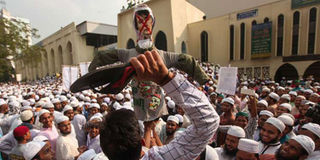Myanmar's Aung San Suu Kyi accused of failing to protect Rohingya Muslims

Bangladeshi activists from several Islamic groups hit an effigy of State Counsellor of Myanmar Aung San Suu Kyi in Dhaka, Bangladesh on November 25, 2016 during a protest rally against the persecution of Rohingya Muslims in Myanmar. PHOTO | RAJIB DHAR | AFP
What you need to know:
The democracy icon, garlanded by the international community as a moral force during Myanmar’s junta years, has remained near-silent despite evidence of army abuses in Rakhine State.
The United Nations has said recent security operations amount to ethnic cleansing of the Muslim Rohingya minority, with thousands fleeing to Bangladesh.
YANGON, Friday
Nobel Peace Prize winner Aung San Suu Kyi stands accused of failing to protect Myanmar’s Rohingya Muslims from what rights groups say is a systematic campaign of abuse by the military.
The democracy icon, garlanded by the international community as a moral force during Myanmar’s junta years, has remained near-silent despite evidence of army abuses in Rakhine State.
The United Nations has said recent security operations amount to ethnic cleansing of the Muslim Rohingya minority, with thousands fleeing to Bangladesh.
Suu Kyi, the 1991 Nobel Peace Prize winner and Myanmar’s de facto leader, has seen her halo start to slip since her party took power this year after winning the country’s first free elections in a generation.
“Her failure to speak out is baffling to an international audience that persists in casting her as a rights icon,” said David Mathieson of Human Rights Watch.
“One version to explain her silence is indifference, another is calculated limited messaging... but the most likely is she has no control over the army.”
Thousands of Rohingya have fled the lockdown in Rakhine to Bangladesh, bringing with them horrifying stories of gang rape, torture and murder at the hands of the military.
Rights groups say the military has used attacks on police border posts last month as an excuse for a crackdown on the Rohingya, a Muslim group reviled by many Myanmar Buddhists.
The government says troops are defending the country from an armed insurgency.
It has barred investigators and foreign journalists from the locked-down area and lashed out at reports of abuse as fabrications.
Suu Kyi, who has travelled to India and Japan during the six-week crisis, has commented only to say an investigation into the attacks was underway.
The UN special rapporteur on Myanmar, Yanghee Lee, says the lockdown is unacceptable.
Researchers at Queen Mary University, London say her silence amounts to legitimising genocide and entrenching persecution of the Rohingya.




